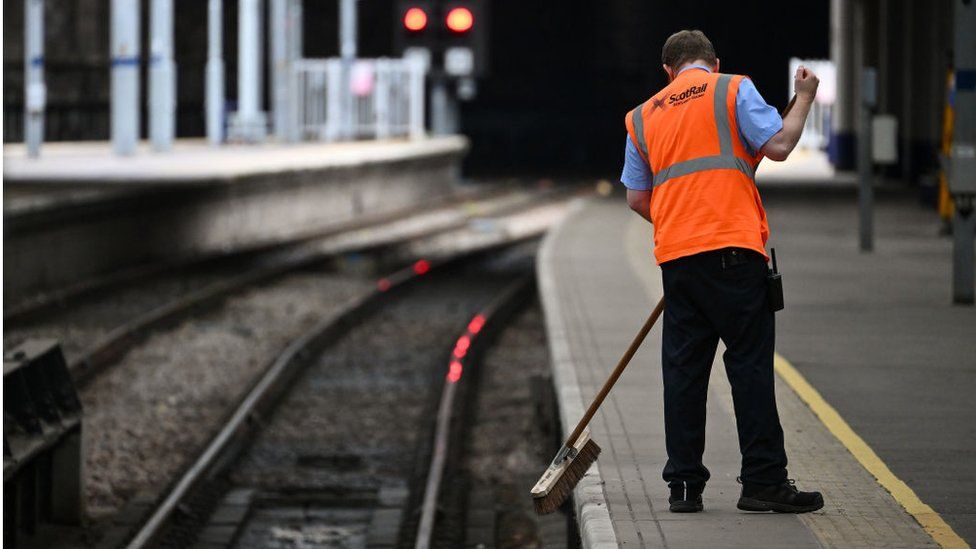Train drivers to go on strike on 30 July
- Published
- comments

Train drivers at eight rail companies will strike on Saturday, 30 July in a dispute over pay, union Aslef has said.
A total of 5,500 staff will walk out after talks broke down over pay, with the union seeking wages to keep pace with the rising cost of living.
It comes a day after the RMT union, which represents workers such as guards and signalling staff, said it would strike on Wednesday, 27 July.
Transport Secretary Grant Shapps called the strike action "destructive".
Mick Whelan, general secretary of Aslef, which represents train drivers, said its members "don't want go on strike" but train companies had offered "nothing" and claimed the union had been "forced into this position by the train companies, driven by the Tory government".
"We don't want to inconvenience passengers - not least because our friends and families use public transport, too, and we believe in building trust in the railways in Britain - and we don't want to lose money by going on strike," he said.
Mr Whelan said the union was open to further talks for a "fair and sensible offer".
The date of action on 30 July coincides with the Commonwealth Games, which are being held in Birmingham. The event runs from 28 July until 8 August. It is also the the opening day of the new season for most English Football League clubs.
It is understood the action could have a knock-on effect on services running on the Sunday.
Mr Shapps said: "It's incredibly disappointing that, just three days after their ballots closed, Aslef bosses have already opted for destructive strike action, instead of engaging in constructive talks.
"Not only that but, by cynically orchestrating strike dates around the Commonwealth Games, it's clear union bosses are determined to cause as much misery as possible and derail an event the whole country is looking forward to."
Train drivers at the following companies are set to strike:
- Arriva Rail London
- Chiltern Railways
- Great Western Railway
- LNER
- Greater Anglia
- Southeastern
- Hull Trains
- West Midlands Trains
The Rail Delivery Group, which represents train companies, said strike action will "cause misery, frustration and anger for millions".
It claimed the walk out would "take money out of an industry" and make it harder to give a pay rise in the future.
"We want to give our people an increase in pay, but asking taxpayers to shoulder even more of the burden when they have already contributed £600 per household during the pandemic, or asking passengers to fund it by paying more for their tickets, isn't fair or sustainable," it said.
Aslef has already held strike days on Greater Anglia services and another is scheduled for Saturday 23 July. Drivers at Hull Trains are also due to strike on 16 and 23 July.
But today's announcement marks the first time during its current dispute that the union has co-ordinated action by this number of operators on the same day.
If it does go ahead, it won't bring the entire rail network to a halt. But it would cause widespread disruption, during the Commonwealth Games.
It's in the diary for only a few days after the RMT has scheduled its next strike day - which, judging by the previous strikes in June, would have a knock-on impact on services the following day as well.
Unless settlements can be reached to prevent the strikes going ahead, a summer of disruption on the railway is shaping up.
The cost of living is rising at the fastest rate for 40 years, with inflation at 9.1% and forecast to hit 11% before the end of the year.
The increase has led to many unions calling for pay rises to help workers cope. Several industries, including the railways, airports and the Royal Mail, have voted to go strike.
RMT workers walked out for three days in June in a row over pay and jobs, disrupting rail services across the country.
But the government has warned against employers handing out big increases in salaries over fears of a 1970s-style "inflationary spiral", where firms hike wages and then pass the cost on to customers via higher prices.
Aslef's Mr Whelan said wage rises were not "exacerbating inflation", saying "excess profiteering is".
"The government isn't asking companies to cut profits or dividend payments to help manage inflation. Wages are chasing prices, not putting them up," he said.
However, the Night Time Industries Association industry group said strikes "have already had a devastating impact on the late night economy and hospitality industries are still rebuilding from the fall out of the pandemic".
Fresh strikes will put further pressure on businesses, it said.
Related Topics
- Published13 July 2022
- Published12 July 2022